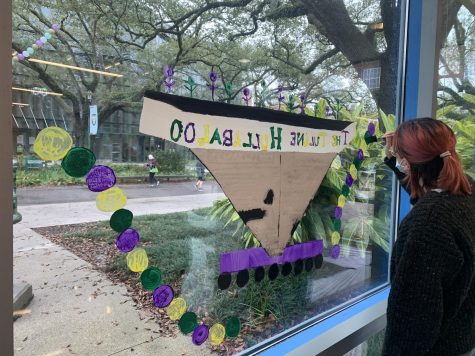OPINION | Asynchronous events are different, not worse
April 21, 2021

Citizens across the nation have had to learn to adapt to a new way of life imposed by COVID-19. Despite unique living conditions imposed by COVID-19 policies and restrictions, many Americans have found various ways to connect with one another and build community. Drive-by graduations, Zoom dinner parties and socially distanced block parties are a few examples of COVID-19-conscious events. Here in New Orleans, people’s innate need for community were evident in this year’s COVID-19-friendly Mardi Gras celebration.
This past March, a Mardi Gras like no other rewrote an age-old tradition. Forced to accommodate COVID-19 restrictions regarding gathering sizes, numerous houses across the city of New Orleans decorated their front yards and porches as if they were traditional Mardi Gras floats. Several homes decorated as Mardi Gras floats standing side by side created the illusion of moving, animated floats when driving by in a car. Of course, the houses were not moving in a steady parade down a street, however, a similar effect could be achieved by car or on foot.
Unlike parades in years past, this year’s COVID-19-friendly Mardi Gras floats could be enjoyed at any time throughout the day over the course of several weeks. Thus, this COVID-19 house float parade was a more accessible experience enjoyed by many people.
Historically a religious celebration, Mardi Gras today still honors many of the principles of its religious origin. Some participants consider the Mardi Gras parades a signal of the final celebration before the religious holiday Ash Wednesday, and for others, the parade simply signifies a celebration of life. In both instances, Mardi Gras is a celebration of community.
New Orleans’ 2021 Mardi Gras house floats are an excellent example of adaptability and positivity despite unprecedented circumstances. A celebration that is quintessentially New Orleanian was preserved this year thanks to the admirable liveliness of house floats.
Asynchronous events that adhere to COVID-19 health and safety protocols can be just as powerful and effective as traditional events, as the house floats have demonstrated. Although this year’s Mardi Gras celebration looked a little different, this does not mean it was any worse.
More recently, Tulane University frequently offers virtual and COVID-19-safe events to students and other members of the Tulane community. Tulane’s calendar of events from the past month cites numerous speakers that the university has hosted. For example, Tulane University Campus Programming hosted award-winning comedian Cody Ko. Virtual events hosted by Tulane offer incredible opportunities that may not have been otherwise possible. Not only are these virtual events COVID-19-conscious, but virtual events also have the capacity to address geographical limitations. Evident in both virtual speaker events and the Mardi Gras house floats, virtual or asynchronous events allow groups of people to come together and celebrate, albeit in a different way, community.
Incorporating and embracing asynchronous events does not invalidate the value of the in-person events from which they were conceived. Asynchronous and virtual events are not objectively inferior to their pre-COVID-19 counterparts.
In fact, asynchronous events such as house floats and virtual concerts are wonderful and valuable in many ways that have perhaps been overlooked by wistful nostalgics. House floats, as opposed to traditional Mardi Gras parades, afford individuals a more personalized experience of the festival. In the comfort of one’s own car, a favorite tune floats out the rolled-down windows. Each spectator, in their personalized conditions, drives down St. Charles Avenue admiring the house floats. The music that pours from the windows of numerous cars creates a beautiful cacophony that mimics the sound of celebrations past.
Ultimately, New Orleans’ Mardi Gras celebration is grounded in principles of community. It is a celebration of life, history, people and coming together. So then, this year’s Mardi Gras really does not stray all that far from celebrations of previous years. In fact, this year’s celebration demonstrates better than ever the resilience, dedication and selflessness of New Orleanians. With a necessary sensitivity for unprecedented times, New Orleanians certainly did not give up on Mardi Gras this year. Rather, this year was an important reminder that Mardi Gras is nothing without the strong and thoughtful community that celebrates it. Alongside and amongst these New Orleanians are Tulanians. Like New Orleanians celebrating Mardi Gras with house floats, Tulane students and faculty continue to uphold the principles of community by embracing virtual and asynchronous events. Together, Tulane and New Orleans preserve a sense of community despite unusual circumstances.








Leave a Comment